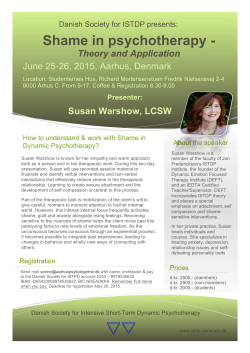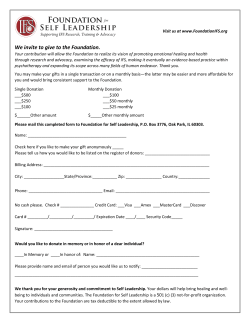
May 16 Full Event Details - Section II
The Science of the Art of Psychotherapy: A Master-Class with Allan Schore UCLA David Geffen School of Medicine May 16, 2015 Manchester, New Hampshire In this workshop Dr. Schore will discuss the essential themes of his recently published book, The Science of the Art of Psychotherapy (Norton). Using the biopsychosocial perspective of Regulation Theory, a model of the development, psychopathogenesis, and treatment of the implicit self, he will discuss a number of essential clinical phenomena that occur beneath the words of the patient and therapist. He will suggest that due to significant advances in neuroscience we are currently experiencing a paradigm shift in psychotherapy, from conscious cognition to unconscious affect. Referring to his current clinical, research, and theoretical studies in neuropsychoanalysis, traumatology, and developmental affective neuroscience, he will discuss the relational and neurobiological change mechanisms that lie at the core of psychotherapy, especially in heightened affective moments of treatment. Over the course of the day he will offer a number of PowerPoint – audience dialogues which suggest that changes in the connectivity of the “emotional” right brain is a fundamental outcome of effective treatment, and that the incorporation of current scientific studies of the right brain into updated clinical models allows for a deeper understanding of not only why but how psychotherapy works. AM: Working in the right brain: A regulation model of clinical expertise for treatment of attachment trauma This lecture will offer an interpersonal neurobiological model of psychotherapeutic expertise for working with early-forming relational (attachment) trauma. The paradigm shift alters our conception of clinical expertise from one who offers insight-oriented interpretations in order make the unconscious conscious to one who optimally processes and regulates the patient’s unconsciously communicated bodily-based affective states in order to facilitate development of the unconscious mind itself. PM: Therapeutic enactments: working in right brain windows of affect tolerance The ongoing paradigm shift is deepening our understanding of the affective and neurobiological dynamics of clinical enactments. Very recent relational and neuropsychoanalytic models posit that enactments are eruptions of unconsciously strong overwhelming affect within the therapeutic relationship and not technical mistakes, and that they represent a way of reaching deeply into traumatized areas. The shift from cognition to emotion, from conscious to unconscious processes, and from left to right brain allows for a deeper understanding of how regulated enactments are a central mechanism of therapeutic action, especially for patients with a history of attachment trauma. When: Saturday, May 16th, 8:30am registration; 9:00am – 4:30pm Where: Southern NH University (Hospitality Center), Manchester NH Cost: $150 registration by April 16 ($160 thereafter); $100 for students and trainees Sponsors: NH-NASW, NH Psychological Association, and VT Society of Modern Psychoanalysis Contact for CEU info and registration: naswnh@worldpath.net 603-226-7135 (M and W)
© Copyright 2025









